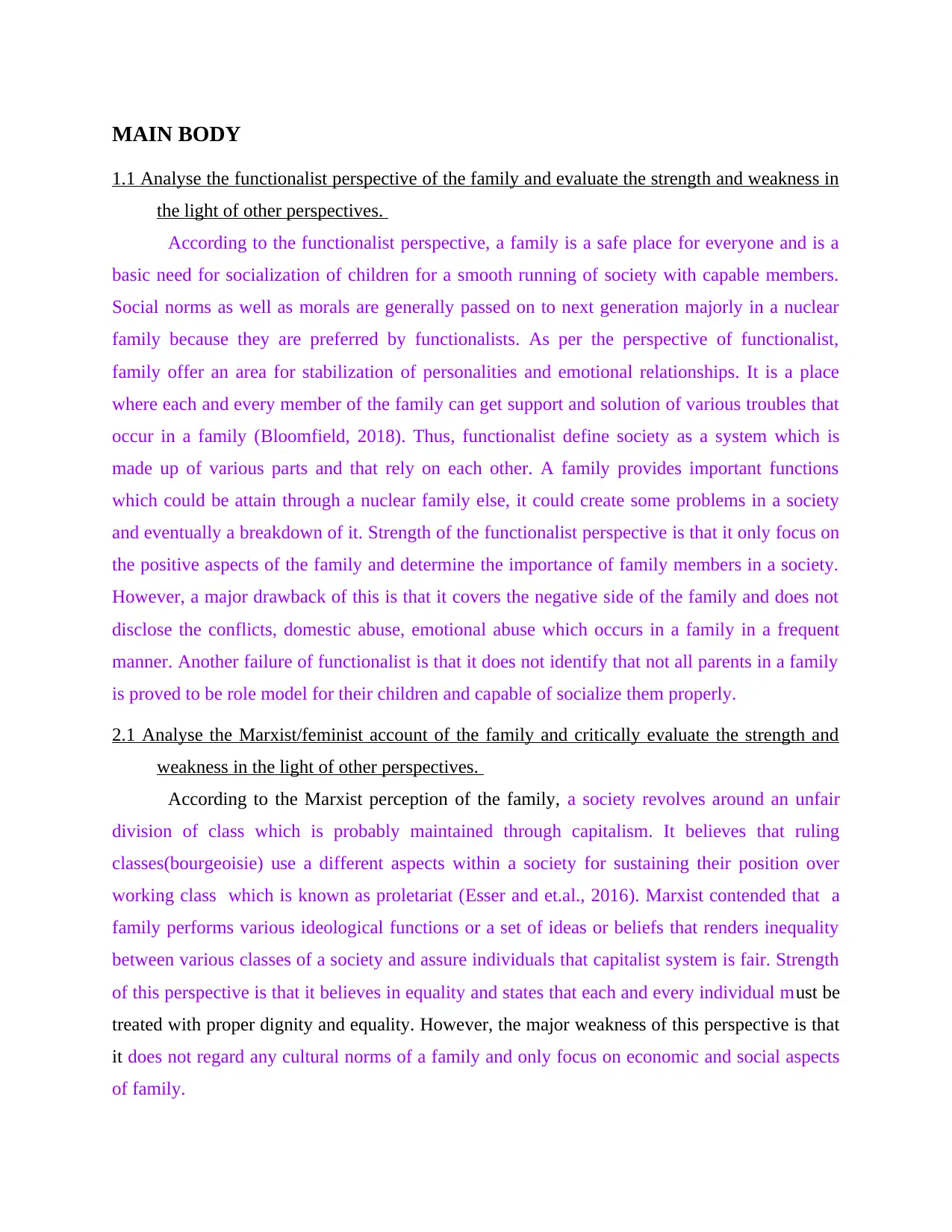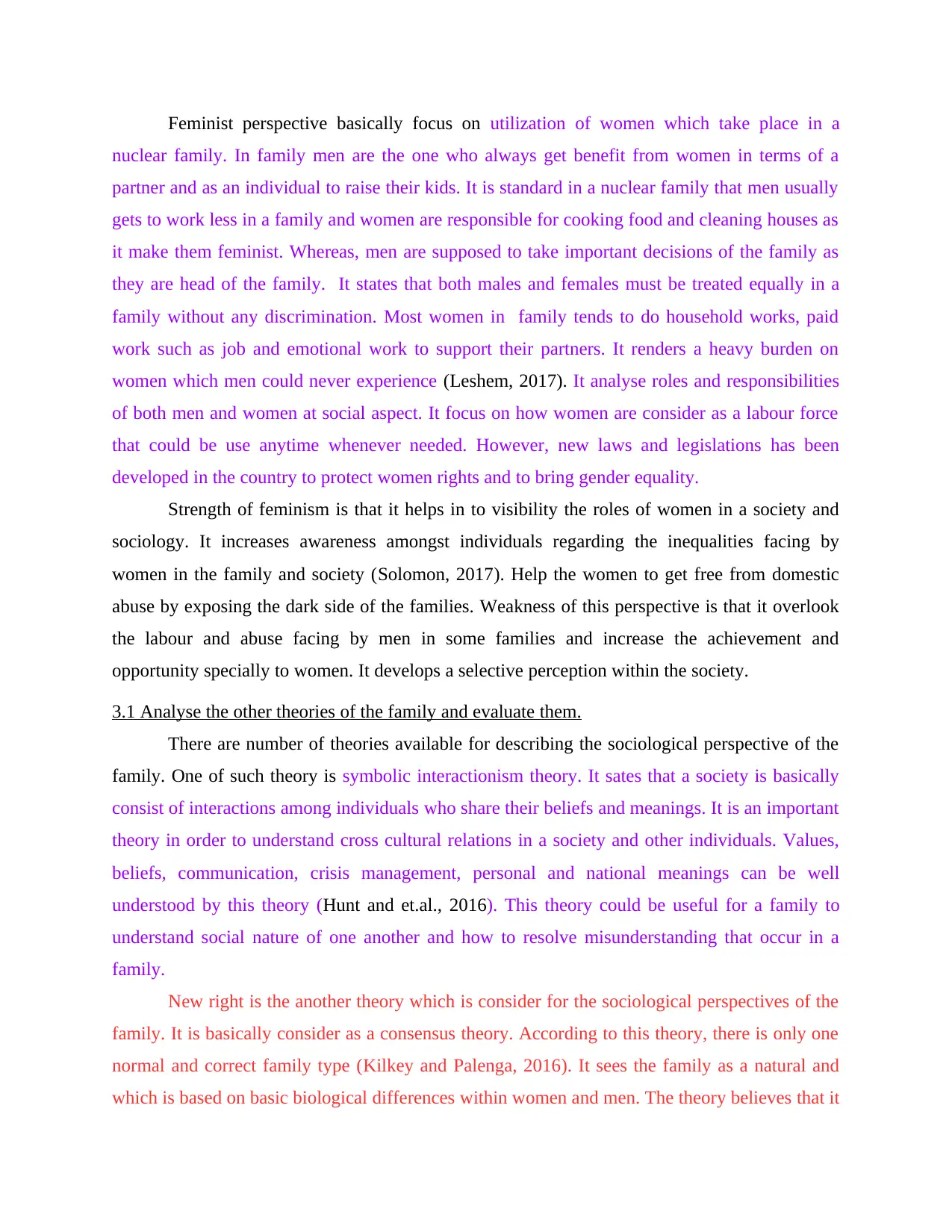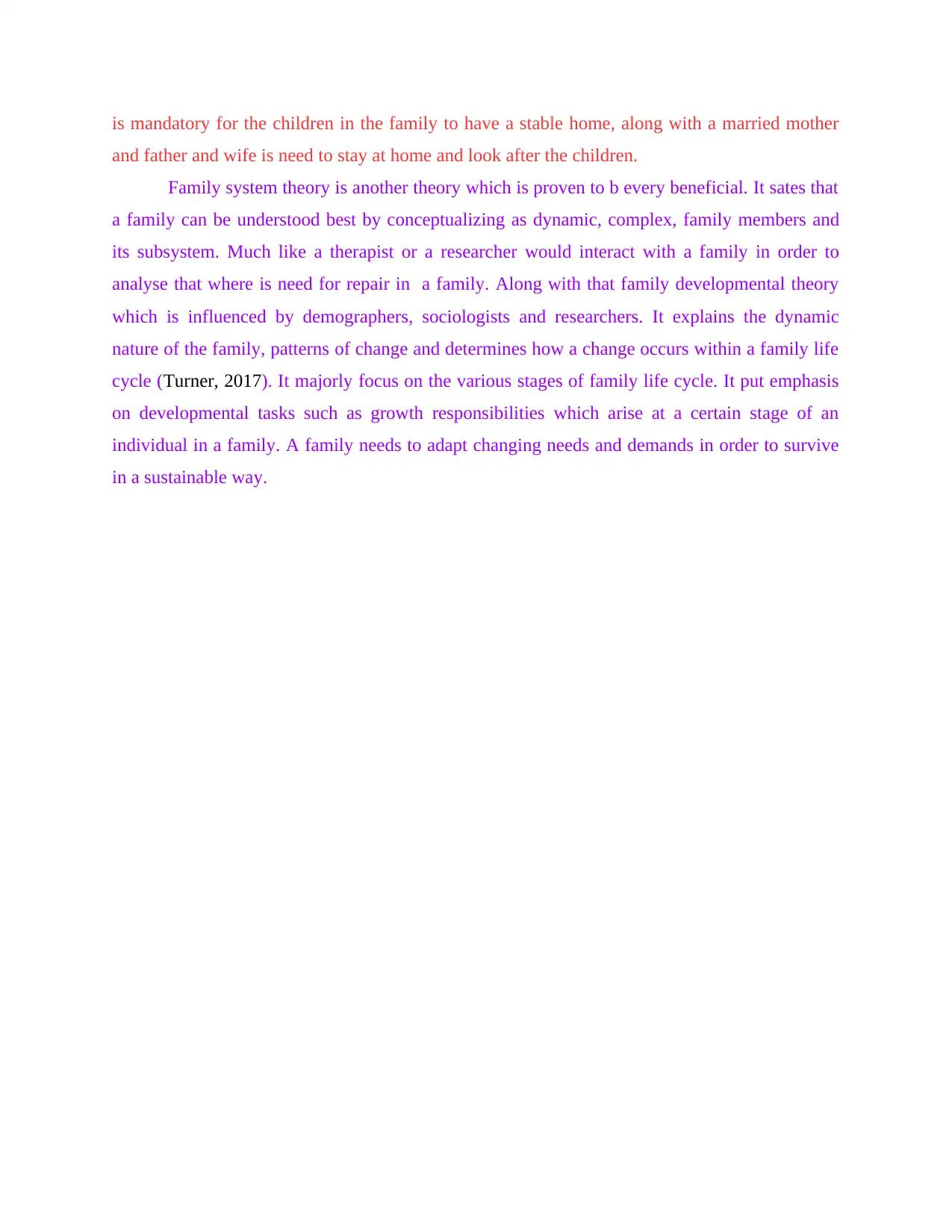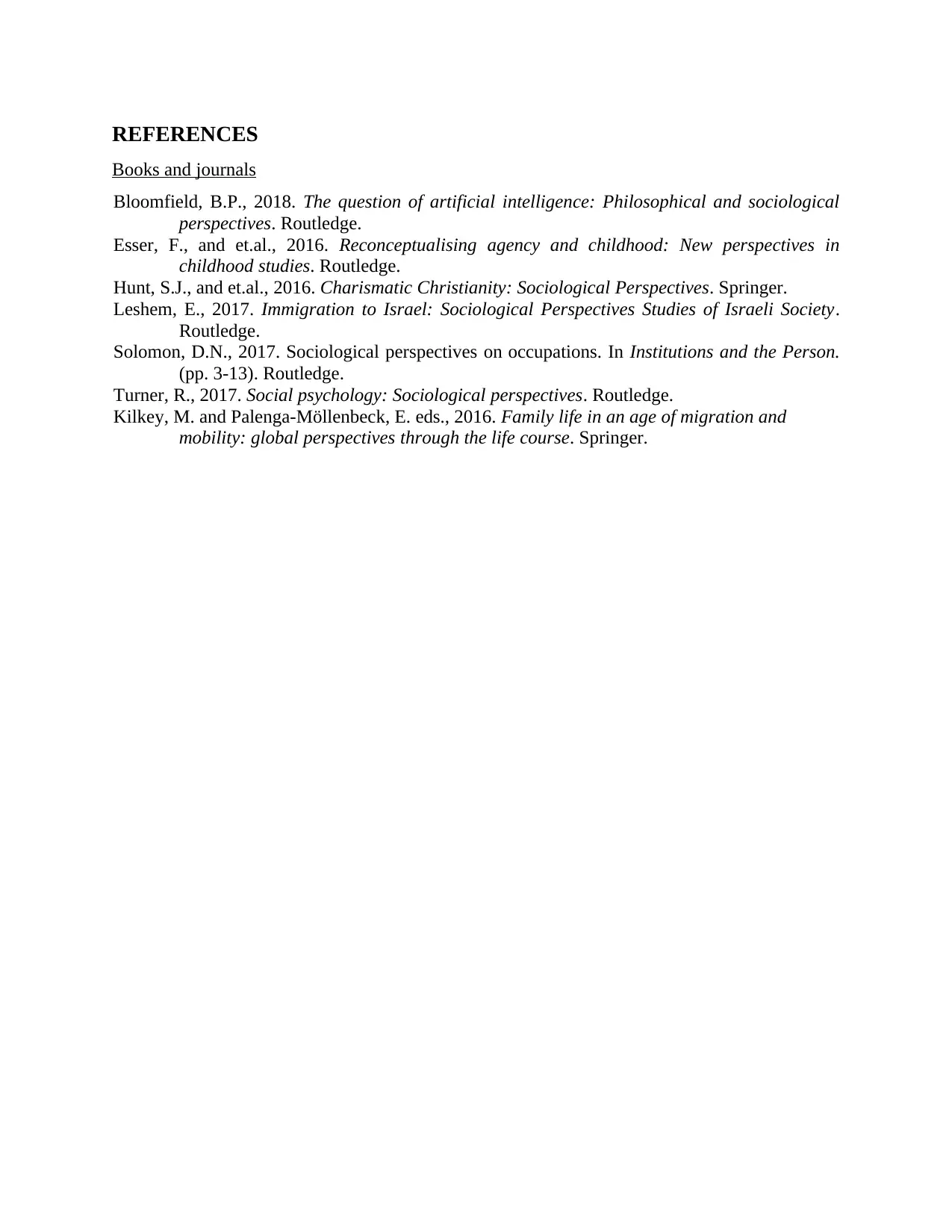Sociology of Family: Perspectives, Theories, and Evaluation
VerifiedAdded on 2023/01/16
|7
|1309
|29
Essay
AI Summary
This essay delves into various sociological perspectives on the family, beginning with an analysis of the functionalist perspective, exploring its strengths in highlighting the family's role in socialization and stability, while also acknowledging its limitations in addressing negative aspects like conflict and abuse. The essay then examines the Marxist and feminist accounts, evaluating their strengths and weaknesses in light of other perspectives, particularly focusing on the impact of class and gender dynamics within the family structure. Furthermore, the essay explores other relevant theories, including symbolic interactionism, new right, family systems, and family developmental theories, to provide a comprehensive understanding of the sociological perspectives on the family and how they contribute to understanding its complexities.

Paraphrase This Document
Need a fresh take? Get an instant paraphrase of this document with our AI Paraphraser

MAIN BODY
1.1 Analyse the functionalist perspective of the family and evaluate the strength and weakness in
the light of other perspectives.
According to the functionalist perspective, a family is a safe place for everyone and is a
basic need for socialization of children for a smooth running of society with capable members.
Social norms as well as morals are generally passed on to next generation majorly in a nuclear
family because they are preferred by functionalists. As per the perspective of functionalist,
family offer an area for stabilization of personalities and emotional relationships. It is a place
where each and every member of the family can get support and solution of various troubles that
occur in a family (Bloomfield, 2018). Thus, functionalist define society as a system which is
made up of various parts and that rely on each other. A family provides important functions
which could be attain through a nuclear family else, it could create some problems in a society
and eventually a breakdown of it. Strength of the functionalist perspective is that it only focus on
the positive aspects of the family and determine the importance of family members in a society.
However, a major drawback of this is that it covers the negative side of the family and does not
disclose the conflicts, domestic abuse, emotional abuse which occurs in a family in a frequent
manner. Another failure of functionalist is that it does not identify that not all parents in a family
is proved to be role model for their children and capable of socialize them properly.
2.1 Analyse the Marxist/feminist account of the family and critically evaluate the strength and
weakness in the light of other perspectives.
According to the Marxist perception of the family, a society revolves around an unfair
division of class which is probably maintained through capitalism. It believes that ruling
classes(bourgeoisie) use a different aspects within a society for sustaining their position over
working class which is known as proletariat (Esser and et.al., 2016). Marxist contended that a
family performs various ideological functions or a set of ideas or beliefs that renders inequality
between various classes of a society and assure individuals that capitalist system is fair. Strength
of this perspective is that it believes in equality and states that each and every individual must be
treated with proper dignity and equality. However, the major weakness of this perspective is that
it does not regard any cultural norms of a family and only focus on economic and social aspects
of family.
1.1 Analyse the functionalist perspective of the family and evaluate the strength and weakness in
the light of other perspectives.
According to the functionalist perspective, a family is a safe place for everyone and is a
basic need for socialization of children for a smooth running of society with capable members.
Social norms as well as morals are generally passed on to next generation majorly in a nuclear
family because they are preferred by functionalists. As per the perspective of functionalist,
family offer an area for stabilization of personalities and emotional relationships. It is a place
where each and every member of the family can get support and solution of various troubles that
occur in a family (Bloomfield, 2018). Thus, functionalist define society as a system which is
made up of various parts and that rely on each other. A family provides important functions
which could be attain through a nuclear family else, it could create some problems in a society
and eventually a breakdown of it. Strength of the functionalist perspective is that it only focus on
the positive aspects of the family and determine the importance of family members in a society.
However, a major drawback of this is that it covers the negative side of the family and does not
disclose the conflicts, domestic abuse, emotional abuse which occurs in a family in a frequent
manner. Another failure of functionalist is that it does not identify that not all parents in a family
is proved to be role model for their children and capable of socialize them properly.
2.1 Analyse the Marxist/feminist account of the family and critically evaluate the strength and
weakness in the light of other perspectives.
According to the Marxist perception of the family, a society revolves around an unfair
division of class which is probably maintained through capitalism. It believes that ruling
classes(bourgeoisie) use a different aspects within a society for sustaining their position over
working class which is known as proletariat (Esser and et.al., 2016). Marxist contended that a
family performs various ideological functions or a set of ideas or beliefs that renders inequality
between various classes of a society and assure individuals that capitalist system is fair. Strength
of this perspective is that it believes in equality and states that each and every individual must be
treated with proper dignity and equality. However, the major weakness of this perspective is that
it does not regard any cultural norms of a family and only focus on economic and social aspects
of family.

Feminist perspective basically focus on utilization of women which take place in a
nuclear family. In family men are the one who always get benefit from women in terms of a
partner and as an individual to raise their kids. It is standard in a nuclear family that men usually
gets to work less in a family and women are responsible for cooking food and cleaning houses as
it make them feminist. Whereas, men are supposed to take important decisions of the family as
they are head of the family. It states that both males and females must be treated equally in a
family without any discrimination. Most women in family tends to do household works, paid
work such as job and emotional work to support their partners. It renders a heavy burden on
women which men could never experience (Leshem, 2017). It analyse roles and responsibilities
of both men and women at social aspect. It focus on how women are consider as a labour force
that could be use anytime whenever needed. However, new laws and legislations has been
developed in the country to protect women rights and to bring gender equality.
Strength of feminism is that it helps in to visibility the roles of women in a society and
sociology. It increases awareness amongst individuals regarding the inequalities facing by
women in the family and society (Solomon, 2017). Help the women to get free from domestic
abuse by exposing the dark side of the families. Weakness of this perspective is that it overlook
the labour and abuse facing by men in some families and increase the achievement and
opportunity specially to women. It develops a selective perception within the society.
3.1 Analyse the other theories of the family and evaluate them.
There are number of theories available for describing the sociological perspective of the
family. One of such theory is symbolic interactionism theory. It sates that a society is basically
consist of interactions among individuals who share their beliefs and meanings. It is an important
theory in order to understand cross cultural relations in a society and other individuals. Values,
beliefs, communication, crisis management, personal and national meanings can be well
understood by this theory (Hunt and et.al., 2016). This theory could be useful for a family to
understand social nature of one another and how to resolve misunderstanding that occur in a
family.
New right is the another theory which is consider for the sociological perspectives of the
family. It is basically consider as a consensus theory. According to this theory, there is only one
normal and correct family type (Kilkey and Palenga, 2016). It sees the family as a natural and
which is based on basic biological differences within women and men. The theory believes that it
nuclear family. In family men are the one who always get benefit from women in terms of a
partner and as an individual to raise their kids. It is standard in a nuclear family that men usually
gets to work less in a family and women are responsible for cooking food and cleaning houses as
it make them feminist. Whereas, men are supposed to take important decisions of the family as
they are head of the family. It states that both males and females must be treated equally in a
family without any discrimination. Most women in family tends to do household works, paid
work such as job and emotional work to support their partners. It renders a heavy burden on
women which men could never experience (Leshem, 2017). It analyse roles and responsibilities
of both men and women at social aspect. It focus on how women are consider as a labour force
that could be use anytime whenever needed. However, new laws and legislations has been
developed in the country to protect women rights and to bring gender equality.
Strength of feminism is that it helps in to visibility the roles of women in a society and
sociology. It increases awareness amongst individuals regarding the inequalities facing by
women in the family and society (Solomon, 2017). Help the women to get free from domestic
abuse by exposing the dark side of the families. Weakness of this perspective is that it overlook
the labour and abuse facing by men in some families and increase the achievement and
opportunity specially to women. It develops a selective perception within the society.
3.1 Analyse the other theories of the family and evaluate them.
There are number of theories available for describing the sociological perspective of the
family. One of such theory is symbolic interactionism theory. It sates that a society is basically
consist of interactions among individuals who share their beliefs and meanings. It is an important
theory in order to understand cross cultural relations in a society and other individuals. Values,
beliefs, communication, crisis management, personal and national meanings can be well
understood by this theory (Hunt and et.al., 2016). This theory could be useful for a family to
understand social nature of one another and how to resolve misunderstanding that occur in a
family.
New right is the another theory which is consider for the sociological perspectives of the
family. It is basically consider as a consensus theory. According to this theory, there is only one
normal and correct family type (Kilkey and Palenga, 2016). It sees the family as a natural and
which is based on basic biological differences within women and men. The theory believes that it
⊘ This is a preview!⊘
Do you want full access?
Subscribe today to unlock all pages.

Trusted by 1+ million students worldwide

is mandatory for the children in the family to have a stable home, along with a married mother
and father and wife is need to stay at home and look after the children.
Family system theory is another theory which is proven to b every beneficial. It sates that
a family can be understood best by conceptualizing as dynamic, complex, family members and
its subsystem. Much like a therapist or a researcher would interact with a family in order to
analyse that where is need for repair in a family. Along with that family developmental theory
which is influenced by demographers, sociologists and researchers. It explains the dynamic
nature of the family, patterns of change and determines how a change occurs within a family life
cycle (Turner, 2017). It majorly focus on the various stages of family life cycle. It put emphasis
on developmental tasks such as growth responsibilities which arise at a certain stage of an
individual in a family. A family needs to adapt changing needs and demands in order to survive
in a sustainable way.
and father and wife is need to stay at home and look after the children.
Family system theory is another theory which is proven to b every beneficial. It sates that
a family can be understood best by conceptualizing as dynamic, complex, family members and
its subsystem. Much like a therapist or a researcher would interact with a family in order to
analyse that where is need for repair in a family. Along with that family developmental theory
which is influenced by demographers, sociologists and researchers. It explains the dynamic
nature of the family, patterns of change and determines how a change occurs within a family life
cycle (Turner, 2017). It majorly focus on the various stages of family life cycle. It put emphasis
on developmental tasks such as growth responsibilities which arise at a certain stage of an
individual in a family. A family needs to adapt changing needs and demands in order to survive
in a sustainable way.
Paraphrase This Document
Need a fresh take? Get an instant paraphrase of this document with our AI Paraphraser


REFERENCES
Books and journals
Bloomfield, B.P., 2018. The question of artificial intelligence: Philosophical and sociological
perspectives. Routledge.
Esser, F., and et.al., 2016. Reconceptualising agency and childhood: New perspectives in
childhood studies. Routledge.
Hunt, S.J., and et.al., 2016. Charismatic Christianity: Sociological Perspectives. Springer.
Leshem, E., 2017. Immigration to Israel: Sociological Perspectives Studies of Israeli Society.
Routledge.
Solomon, D.N., 2017. Sociological perspectives on occupations. In Institutions and the Person.
(pp. 3-13). Routledge.
Turner, R., 2017. Social psychology: Sociological perspectives. Routledge.
Kilkey, M. and Palenga-Möllenbeck, E. eds., 2016. Family life in an age of migration and
mobility: global perspectives through the life course. Springer.
Books and journals
Bloomfield, B.P., 2018. The question of artificial intelligence: Philosophical and sociological
perspectives. Routledge.
Esser, F., and et.al., 2016. Reconceptualising agency and childhood: New perspectives in
childhood studies. Routledge.
Hunt, S.J., and et.al., 2016. Charismatic Christianity: Sociological Perspectives. Springer.
Leshem, E., 2017. Immigration to Israel: Sociological Perspectives Studies of Israeli Society.
Routledge.
Solomon, D.N., 2017. Sociological perspectives on occupations. In Institutions and the Person.
(pp. 3-13). Routledge.
Turner, R., 2017. Social psychology: Sociological perspectives. Routledge.
Kilkey, M. and Palenga-Möllenbeck, E. eds., 2016. Family life in an age of migration and
mobility: global perspectives through the life course. Springer.
⊘ This is a preview!⊘
Do you want full access?
Subscribe today to unlock all pages.

Trusted by 1+ million students worldwide

1 out of 7
Related Documents
Your All-in-One AI-Powered Toolkit for Academic Success.
+13062052269
info@desklib.com
Available 24*7 on WhatsApp / Email
![[object Object]](/_next/static/media/star-bottom.7253800d.svg)
Unlock your academic potential
Copyright © 2020–2026 A2Z Services. All Rights Reserved. Developed and managed by ZUCOL.





